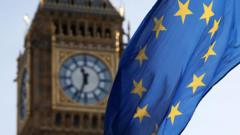As global tensions rise, the UK and EU prepare for a significant summit aimed at reshaping their post-Brexit relationship. Key topics include collaboration on security and defence, addressing trade barriers, and enhancing economic ties amidst shifting alliances.
UK and EU Engage in Diplomatic Negotiations Ahead of Historic Summit

UK and EU Engage in Diplomatic Negotiations Ahead of Historic Summit
The UK and EU prepare for their first bilateral summit since Brexit amid global geopolitical shifts, with discussions set to focus on defence, trade barriers, and economic cooperation.
The UK and European Union are gearing up for their first bilateral summit since Brexit, signaling a pivotal moment in their post-divorce relationship. Scheduled for Monday in London, the summit is expected to address pressing geopolitical concerns while underscoring the necessity for cooperation between the two powers.
On the eve of the summit, officials and analysts acknowledge the complex challenges that remain, yet there is a consensus that the bitterness stemming from Brexit has largely diminished, replaced by a sense of urgency driven by global events. Geopolitical shifts, particularly involving Russia, China, and the ongoing conflict in Ukraine, are pushing both sides towards a collaborative approach.
Leading the discussions is the UK Prime Minister, Sir Keir Starmer, who faces mounting pressure to deliver on the promise of closer ties with the EU. The Labour government, however, is treading carefully, mindful of voter sentiment towards Brexit and the rising Eurosceptic sentiment within the UK, notably from the Reform Party.
On the negotiation table is a package of measures aimed at addressing trade barriers established post-Brexit. An expected joint declaration will highlight shared priorities relating to regional security, include a new security and defence pact, and propose measures to enhance trade relations. One key aspect under discussion is a plant and animal health agreement designed to simplify trade and minimize complications for exporters.
However, EU nations, led by France, continue to assert their interests, particularly regarding fishing rights in UK waters and their stance on EU defence contracts. The fishing agreement from the post-Brexit arrangement is set to expire next year, making these negotiations critical.
The summit will also cover migration, with the UK government insisting on reduced numbers while potentially initiating a youth mobility scheme aimed at EU citizens, fostering cross-border opportunities.
Amidst these negotiations, both sides recognize the need for increased defence collaboration due to changing global dynamics, particularly concerning security threats in Europe. For the UK to access EU defense contracts linked to the new re-armament initiative, understanding among factions within the EU remains essential.
While the discussions may seem ambitious, the complexity of negotiations and the need for compromise present significant hurdles. Both nations now approach the summit with a mix of cautious optimism, hope for tangible outcomes, and an awareness of the intricate web of political and economic implications involved.


















